Joyce T. Strand's Blog, page 7
June 12, 2016
CHECK IT OUT: Bad Boys After Dark: Mick by Melissa Foster, Coming June 22
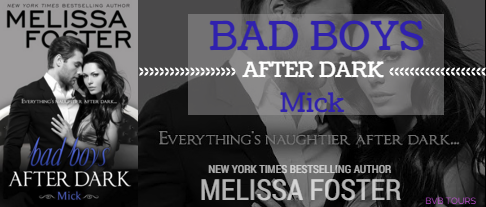
 RELEASING JUNE 22ND........Bad Boys After Dark: Mick
RELEASING JUNE 22ND........Bad Boys After Dark: MickIndulge your inner vixen...
You asked for naughtier lovers, with the same fierce loyalty as The Bradens - Meet the Bad Boys... Four sinfully sexy, uber alpha brothers, about to fall head over heels for their leading ladies..
Everything's naughtier after dark...Amanda Jenner is done being a boring-man magnet and has finally taken control of her love life. As any smart paralegal would, she’s researched the hell out of how to seduce a man. She’s waxed, primped, and ready to put her newfound skills into action—and a masquerade bar crawl is the perfect venue for her solo coming-out party.
Entertainment attorney Mick Bad lives by two hard and fast rules. He never mixes business with pleasure, and he doesn’t do relationships, which makes the anonymity of a masquerade bar crawl the perfect place for a onetime hookup.
Amanda thinks she’s hit the jackpot when she bags a tall, dark, and sinfully delicious masked man—until she discovers the man she’s made out with is her off-limits boss. Mick’s already crossed a line he can never uncross, and one taste of sweet and sexy Amanda has only whet his appetite. When Mick offers to give Amanda a lesson in seduction—no strings, no regrets, and for goodness’ sake, come Monday, no quitting—the tables turn, and Mick’s totally unprepared for the lessons this sweet temptress provides.
The Bad Boys are a series of stand-alone romances that may also be enjoyed as part of the larger Love in Bloom series.
**CONTENT WARNING: Due to mature content, recommended for readers aged 18+**
Available to pre-order from ...
Amazon.com Amazon.co.uk Barnes and Noble KOBO iBooks

"If you're interested in books with super-hot alpha males, ridiculously sexy heroines and need-to-take-a-cold-shower love scenes, this is the series for you!" M. Engel, Book Mama Blog
BAD BOYS AFTER DARK
Mick (now available)
Dylan (releasing Dec 21st pre-order here
Carson (coming soon)
Brett (coming soon)
More After Dark books available now...

About the author

Melissa Foster is a New York Times & USA Today bestselling and award-winning author. She writes sexy and heartwarming contemporary romance, new adult romance (M/F, M/M, F/F), romantic suspense, thrillers, and historical fiction with emotionally compelling characters that stay with you long after you turn the last page. Melissa's emotional journeys are lovingly erotic and always family oriented. Her books have been recommended by USA Today's book blog, Hagerstown Magazine, The Patriot, and several other print venues. She is the founder of the World Literary Café. When she's not writing, Melissa helps authors navigate the publishing industry through her author training programs on Fostering Success.
Melissa has painted and donated several murals to The Hospital for Sick Children in Washington, DC. Her interests include her family, reading, writing, painting, friends, helping others see the positive side of life, and visiting Cape Cod.
Melissa is available to chat with book clubs and welcomes comments and emails from her readers. Visit Melissa at The World Literary Cafeor her personal website.Never miss a brand new release, special promotions or inside gossip again by simply signing up to receive your newsletter from Melissa.
Find Melissa on the following sites....
Website Facebook Twitter Google+ Goodreads Pinterest TSU Amazon Author Page

 Follow the Book Tour
Follow the Book Tour

Click to get your FREE Love in Bloom Series Reading Order
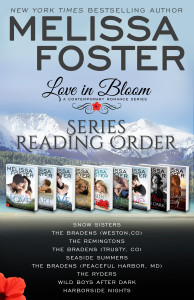
Published on June 12, 2016 21:10
May 31, 2016
Character Interview, THE REPORTER'S STORY, by Joyce T. Strand
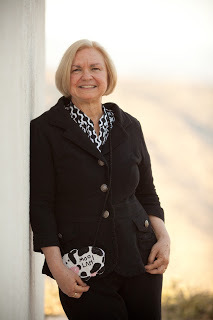 Joyce T. Strand, Author
Joyce T. Strand, AuthorTHE REPORTER'S STORYI am very excited to introduce THE REPORTER’S STORY, my second mystery set in the past, which will be released June 16 with pre-ordering available now.
My protagonist, Emma Matheson, is a reporter in 1912 for the San Francisco Gazette, a fictional newspaper. I based her character on an actual reporter from this time period, Marjorie C. Driscoll, who originally worked for William Randolph Hearst and then in 1921 joined the San Francisco Chronicle, a competitive newspaper to Mr. Hearst. She eventually moved south to the Los Angeles Timeswhere she became a respected front-page contributor.
A graduate of Stanford University in 1913, Driscoll wrote an article in The Stanford Illustrated Review in 1920, titled “In the Newspaper Field” that describes the features of a successful reporter, including the mantra “know a little of everything.” My character, Emma Matheson, follows Driscoll’s values and approach in her quest to become a world-known front-page reporter (Driscoll’s article is available on-line at: http://bit.ly/1Rw0VCv p. 194).
Following is an interview with the character reporter, Emma Matheson.
Q: Tell us something about yourself.
Emma Matheson: I am a reporter for the San Francisco Gazettein 1912. I was hired to cover women’s issues, but I plan to become a respected and well-known front-page reporter of hard news. My mother died when I was born, and I was reared by my father. He owns a newspaper in Sacramento and taught me all about reporting and writing the news. When I told him that I planned to make it my career, he concurred but requested that I go to college first. I enjoyed my studies at the University of California in Berkeley, but I’m excited now to be doing what I love to do: reporting the news.
Q: How do you write your stories?
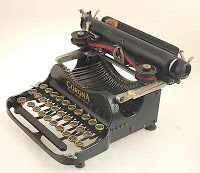 Typewriter similar to what Emma
Typewriter similar to what Emmawould have used in 1912Emma Matheson: My father gave me a typewriter when I went to Berkeley. Until then I used one at his newspaper office. I'm a very fast typist. And I'm told that I'm an excellent writer.
Q: You said you are covering women’s topics. What are they?
Emma Matheson: Well, I must say that I hope to branch out from women’s topics. That’s just a starting point. I do sometimes resent covering city improvement clubs, how to get a husband, and what dress to wear to attract a man. I admit that it’s difficult to branch out to more substantive issues, which are typically reserved for men. But I'm determined.
Q: How do you plan to branch out?
Emma Matheson: I intend to get my stories on the front page by investigating and reporting critical stories that my male counterparts have overlooked. I plan to pursue leads that they wouldn’t even think of and write the story that will make a difference.
Q: And what kind of story might that be?
Emma Matheson: I’m intrigued about a house burglary that the victim denied even occurred. I plan to pursue it. I know there’s something there. Not even an affluent businessman can afford to write off the recovery of $8,000 worth of jewelry. Why, that’s 16 years of my salary!
Q: How do you do your job as a reporter? Are you able to interview people?
 Photo of 1915 San Francisco
Photo of 1915 San Francisco cable car from https://twitter.com/SFMTAPhotoEmma Matheson: Oh, yes. I frequently interview folks. I’m able to get around the City on the newelectric streetcars and my preferred cable cars, which they still need to get up the hills here in San Francisco. And I can cross the Bay to Oakland and Berkeley by ferry. Why I even interviewed the mayor at one of the improvement club meetings.
Also, with the growth of telephones, I can sometimes do interviews on the phone, although I prefer in person.
Q: What about your personal life? Do you have a boy friend or fiancé?
 Candlestick phone
Candlestick phonesimilar to what Emma
would have usedEmma Matheson: No, that’s just not possible. I can’t have a career as a reporter as well as a husband and family. That’s how many female reporters got a bad reputation. Their duties to their family interfered with their reporting duties and pulled them away. They’d miss deadlines and disappoint their editors. That’s not for me.
Q: What do you like to do for fun, when you’re not reporting?
Emma Matheson: Oh, I enjoy the theater, particularly Gilbert and Sullivan. I also read constantly—of course, that’s somewhat career oriented as it’s important to be well-read in order to enable me to have context for my stories by understanding their significance.
Q: Do you have a hero?
Emma Matheson: I think that Nellie Bly must have been so brave to get herself committed to an insane asylum in order to get a story. She is responsible for helping to improve asylums. Oh, and my father. He will always be my most favorite hero.

About THE REPORTER'S STORY:
A house burglary in 1912 San Francisco that the victim denies happening piques Emma Matheson’s reporter instincts. Why would a businessman deny that recovered loot was his and forego collecting his $8,000 worth of stolen jewelry? Why did he fire his maid and butler who originally reported the theft? The more she pursues the burglary that wasn’t a burglary, the more she sees it as a major story, involving murder, intrigue, and smuggling. Can she solve it and write the story that could project her to become the world-famous reporter she so covets? Or will she become one of its victims?
About Joyce T. Strand
Joyce T. Strand is the author of who-done-it contemporary and historical mysteries set in California. All of her published seven novels are inspired by actual events and/or real people, although they are definitely fictionalized.
Her first three contemporary mysteries feature protagonist Jillian Hillcrest, a public relations executive who encounters murder and mayhem at her Silicon Valley company. Jillian’s boss, Brynn Bancroft, solves the next two mysteries when she leaves her position as Chief Financial Officer to run a winery in Sonoma, north of San Francisco.
In Strand’s first historical mystery, a Superior Court Judge strives to discover the truth behind the mystery of a robbery-murder in a small California town in 1939. In her newest mystery, THE REPORTER’S STORY, a house burglary in 1912 San Francisco piques a young reporter’s instincts that leads to intrigue and murder.
Strand headed corporate communications at several biotech and high-tech companies in California's Silicon Valley for more than 25 years. Unlike Jillian, however, she did not encounter murder in her career. Strand lives with her collection of cow statuary in Southern California, and enjoys exploring and writing about the growing wine region in the Ramona Valley near San Diego.
LinksPurchase Links
THE REPORTER'S STORY Available for pre-order:
Amazon -- paperback and Kindle
Unicorn Books and Gifts - signed paperback
Other books available in e-book and book format at:Amazon
Unicorn Books and Gifts - signed paperbacks
For Nook at:Barnes and Noble
Author Links
WebpageFacebookGoodreads Twitter: @joycetstrand
Published on May 31, 2016 18:00
May 25, 2016
WHAT THE EXPERTS SAY: Falguni Kothari, Author
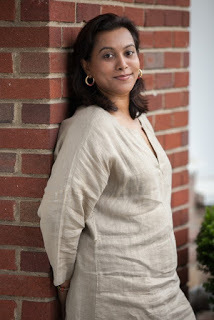 Falguni Kothari, Author
Falguni Kothari, AuthorMY LAST LOVE STORYReviewers describe MY LAST LOVE STORY, Falguni Kothari’s fourth novel, as an examination of “love and loss, desire and desolation, with a deft, wry touch that kept me reading late into the night and moved me to tears.” To create a compelling story, Kothari emphasizes the need to develop relatable characters and claims, “Good chemistry between the characters is a must.” She is not attached to a specific genre, and suggests that her current novel is a cross between contemporary women's fiction and/or an epic romance.
Kothari is working on Book 2 of the Age of Kali series. When she is not writing, she enjoys dancing and has won silver medals in amateur Latin and Ballroom dancing. She also loves to watch serial episodes and has become a Netflix fan.
Do not miss the excerpt from MY LAST LOVE STORY at the end of her interview.
NOTE: Opportunity for $50 Amazon gift card available. You can enter following interview until the end of the tour.
Q: Reviewers have described your new novel MY LAST LOVE STORY as a “love triangle that defies all expectations and crosses all boundaries.” Would you categorize it as a traditional or contemporary romance? Or would you place it in a different genre?
Falguni Kothari: It’s contemporary women’s fiction and/or an epic romance. I guess it straddles genres?
Q: “To make a reader care so much about the characters in a story is a talent that few have.” How do you make your readers care about your characters? Are they people we can all relate to or are they special?
Falguni Kothari: To make readers care about fictional characters, the characters need problems that readers can identify with, certainly what they can relate to. At the very least, they have to recognize what the character is going through even if the reader hasn’t experienced the same or wouldn’t react in the same way to it. In MY LAST LOVE STORY, one of the main characters is a terminal patient, another has been victimized, there are societal pressures of acceptable behavior put on the characters, there are issues of infertility and infidelity. These are common enough problems permeating most households in the world, making the story familiar to the reader and therefore “real.”
Q: Does the concept of hero vs villain play a role in your story—either in a traditional or non-traditional way?
Falguni Kothari: Not in the traditional way. I have a villainous mother, who plays power games because she doesn’t want to relinquish her hold on her son. But, her motives aren’t coming from an evil place. They root from fear.
Q: Reviewers have also claimed that MY LAST LOVE STORY is an “unputdownable read.” How do you drive the reader to want to turn the page?
Falguni Kothari: I think this relates to your question about “caring for your characters.” When you begin to root for your hero or heroine, you want to know what happens to them. Will they find happiness? Will they break up? How will they resolve their misunderstanding? The story should be believable and rooted in reality, yet, interesting and larger than life. The characters should become your best friends and/ or people you envy. People you want to spend your day or night with. People you want to invite home for dinner like long lost friends. But that’s all on the reader, I think. A passionate reader will find pleasure in any story.
Q: Did you write MY LAST LOVE STORY strictly to entertain your readers, or did you embed a few messages along the way?
Falguni Kothari: Oh, MY LAST LOVE STORY is full of messages. The main one is about love. What is love? Is it holding on or letting go? Is it restricted between two people or many? Love is supposed to make you better, then why do so many people become bitter after love?
Q: In your description of MY LAST LOVE STORY, you recommend “Weepers, keep tissues handy.” On the other hand, do you use humor either to create your characters, tell your story, or relieve tension?
Falguni Kothari: I do all three. Humor is my default state of being. My characters will always be witty and funny, sometimes even snarky. MY LAST LOVE STORY was a difficult book to write, because of the subject matter, and I had to keep reminding myself to insert hilarity between the sweet and poignant scenes. I even managed a couple of snarky ones. A good story must invoke a good mix of emotions in the reader. A story should not be one dimensional.
Q: When creating a romance, what are the most important traits, or attributes, of the characters falling in love? What draws characters to each other? How important are setting and timing?
Falguni Kothari: Good chemistry between the characters is a must. There also needs to be just the right amount of conflict between the potential lovers to make their getting together interesting.
Setting and timing are important in all novels for authenticity. Even if everyone knows its fiction, there has to be a sense of reality to it. MY LAST LOVE STORY is set in California. I couldn’t have my characters living in igloos, no matter the cute visual it conjures up.
Q: You have written three other novels in different genres. Do you have a favorite? Or do you prefer exploring different time periods, settings, and genres?
Falguni Kothari: I don’t have a favorite. I have loved writing all my stories. But I had the most fun writing the mythic fantasy because, one, I’m slightly obsessed with mythology and, two, I could play around with magic and demons and bizarre otherworldly goodies.
Q: What’s next?
Falguni Kothari: I’m working on Book 2 of the Age of Kali series. I’m brain-deep in unearthly problems.
Q: Tell us about Falguni Kothari. What do you enjoy doing when you’re not writing?
Falguni Kothari: Well, I enjoy dancing. I’m learning how to samba on Bollywood music and it’s a blast! I’m a serial episode watcher—I’m addicted to Netflix. I read like a maniac. I spoil my dog and give him Godiva. I take care of house and hearth under protest. It seems that in the blink of an eye my day is done. About Falguni Kothari
Falguni Kothari is an internationally bestselling hybrid author and an amateur Latin and Ballroom dance silver medalist with a background in Indian Classical dance. She writes in a variety of genres sewn together by the colorful threads of her South Asian heritage and expat experiences. When not writing or dancing, she fools around on all manner of social media, and loves to connect with her readers. MY LAST LOVE STORY is her fourth novel.
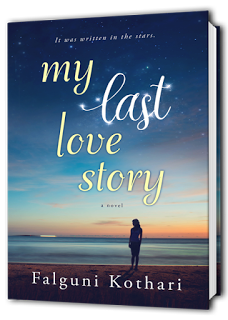 About MY LAST LOVE STORY
About MY LAST LOVE STORYPerfect for fans of Jojo Moyes’s, Me Before You, My Last Love Story is a heartbreakingly romantic tale about the complexities of trauma and whether love can right a wrong.
I, Simeen Desai, am tired of making lemonade with the lemons life has handed me.
Love is meant to heal wounds.
Love was meant to make my world sparkle and spin.
Love has ripped my life apart and shattered my soul.
I love my husband, and he loves me.
But Nirvaan is dying.
I love my husband. I want to make him happy.
But he is asking for the impossible.
I don’t want a baby.
I don’t want to make nice with Zayaan.
I don’t want another chance at another love story.
Excerpt
ONE“Love is a dish best served naked.”
As a child, those oft-quoted words of my father would have me rolling my eyes and pretending to gag at what I’d imagined was my parents’ precursor to a certain physical act.
At thirty, I’d long ago realized that getting naked wasn’t a euphemism for sex.
Neither was love.
It wasn’t my father wording the meme just now but my husband. Nirvaan considered himself a great wit, a New Age philosopher. On the best of days, he was, much like Daddy had been. On the worst days, he was my tormentor.
“What do you think, Dr. Archer? Interesting enough tagline for a vlog? What about ‘Baby in a Petri Dish’?” Nirvaan persisted in eliciting a response from the doctor and/or me for his ad hoc comedy, which we’d been ignoring for several minutes now.
I wanted to glare at him, beg him to shut up, or demand that he wait in the doctor’s office like he should’ve done, like a normal husband would have. Khodai knows why he’d insisted on holding my hand through this preliminary checkup. Nothing of import would happen today—if it did at all. But I couldn’t perform any such communication, not with my eyes and mouth squeezed shut while I suffered through a series of uncomfortable twinges along my nether regions.
I lay flat on my back on a spongy clinic bed sheeted with paper already wrinkled and half torn. Legs drawn up and spread apart, my heels dug punishingly into cold iron stirrups to allow my gynecologist’s clever fingers to reach inside my womb and check if everything was A-OK in there. We’d already funneled through the Pap test and stomach and chest checks. Like them, this test, too, was going swell in light of Dr. Archer’s approving happy hums.
“Excellent, Mrs. Desai. All parts are where they should be,” he joked only as a doctor could.
I shuddered out the breath I’d been holding, as the feeling of being stretched left my body. Nirvaan squeezed my hand and planted a smacking kiss on my forehead. I opened my eyes and focused on his beaming upside-down ones. His eyelids barely grew lashes anymore—I’d counted twenty-seven in total just last week—the effect of years of chemotherapy. For a second, my gaze blurred, my heart wavered, and I almost cried.
What are we doing, Nirvaan? What in Khodai’s name were we starting?
Nirvaan stroked my hair, his pitch-black pupils steady and knowing and oh-so stubborn. Then, his face rose to the stark white ceiling, and all I saw was the green-and-blue mesh of his gingham shirt—the overlapping threads, the crisscross weaves, a pattern without end.
Life is what you make it, child. It was another one of my father’s truisms.
Swallowing the questions twirling on my tongue, I refocused my mind on why we were here. I’d promised Nirvaan we’d try for a baby if he agreed to another round of cancer-blasting treatments. I’d bartered for a few more months of my husband’s life. He’d bartered for immortality through our child.
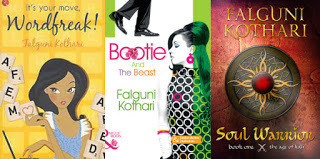
Links
Book LinksGoodreads * Amazon US * Amazon IN
Author Links
Website * Blog * Twitter * Facebook * Goodreads * Pinterest
Giveaway $50 Amazon Gift a Rafflecopter giveaway
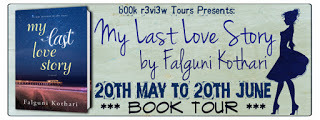
document.write('');
Published on May 25, 2016 21:04
May 4, 2016
WHAT THE EXPERTS SAY: Skylar Nightingale, New Adult Romance Author
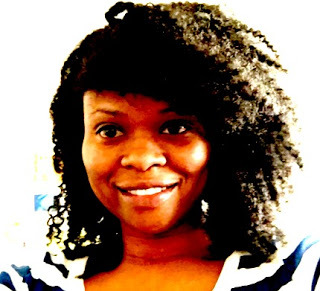 Skylar Nightingale, Author
Skylar Nightingale, AuthorBOUND TO YOU Skylar Nightingale brings us her second novel, BOUND TO YOU, a new adult romance featuring characters between 19 and 22 years old “still discovering who they are.” BOUND TO YOU tells the story from the perspectives of a 19-year-old and her favorite singer. Although she wrote her newest novel for entertainment, she says that there is a message, “Love conquers all.”
Nightingale has been writing since the third grade. She likes characters with “a lot of personality.” She spends most of her spare time writing, but she also likes to listen to music, spend time with her family, and read. She is currently working on a new Young Adult novel.
Don’t miss the excerpt following the interview.
Q: Would you categorize your new romance, BOUND TO YOU, as a contemporary or new adult romance? Why?
Skylar Nightingale: I would categorize it as a new adult romance because of the age range. The characters are between 19 and 22 years old. They are still discovering who they are and who they want to be in the story. The characters are also finding out about love.
Q: A reviewer mentions that BOUND TO YOU is “full of unpredictable twists.” Do you view romance in general as a moving relationship of ups-and-downs? Or just the romance of your protagonists?
Skylar Nightingale: I view romance as a moving relationship of ups-and-downs.
Q: What will make readers care about your characters?
Skylar Nightingale: My characters have a lot personality. You can hear their voices through narration and in dialogue. This helps readers to get to know them and care about them.
Q: How helpful is humor to develop your characters or their romance?
Skylar Nightingale: Humor is important to a certain extent. Some characters are more humorous than others in my stories. In each of my stories so far, the side character or the friend is the one who displays a large comical personality.
Q: What do readers like to read in a satisfactory romance? What will they not tolerate?
Skylar Nightingale: Many readers, including me, like to read stories with a HEA (happily ever after). Readers, this also includes me, do not tolerate stories where children are getting hurt.
Q: You have written BOUND TO YOU from the perspective of two protagonists. That is, one chapter is told from the point of view of the female protagonist followed by the same events from the male protagonist. Why did you choose this approach?
Skylar Nightingale: I wanted the reader to know each individual, to see how they are thinking in the same time span. I wanted to share how each character is experiencing the same moment and how they feel within that moment.
Q: Does the concept of heroes versus villains apply to your story? Do villains impede the progress of the lovers?
Skylar Nightingale: There isn’t any real villain, except the ex-boyfriend who cheats on Nina.
Q: Did you write BOUND TO YOU solely to entertain your readers or did you embed some key messages?
Skylar Nightingale: I wrote BOUND TO YOU solely for entertainment purposes, but there is a message--love conquers all.
Q: What’s next?
Skylar Nightingale: I am currently Q: Tell us about Skylar Nightingale. What do you like to do when you’re not writing?
Skylar Nightingale: I like to spend time with my family, listen to music, and read.
About Skylar Nightingale
Skylar Nightingale grew up in Syracuse, NY where she internalized ideas and events into stories. Skylar discovered her talent when she was in 3rd grade, winning every writing contest except one. When she moved to South Carolina, she entered a writing competition, coming in third place against thousands.
Her first published novel is called FORBIDDEN ACTS. Skylar Nightingale’s second New Adult Romance, BOUND TO YOU was released on April 5th.
When Skylar isn’t behind her keyboard banging out amazing worlds and characters, she can be found spending time with her family, reading, or listening to music.
About BOUND TO YOU
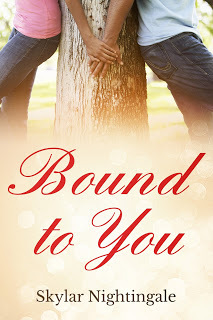 Nineteen year-old Nina Stevens never dreamt it would be possible to meet her favorite singer, Terry Rayborn, until she wins backstage passes and tickets to see the megastar in concert.
Nineteen year-old Nina Stevens never dreamt it would be possible to meet her favorite singer, Terry Rayborn, until she wins backstage passes and tickets to see the megastar in concert.Meeting Terry is surreal, but Nina can’t figure out the immense attraction she feels for someone she just met. Surely, it is physical. After Terry slips her his number and she gives him a call, she begins to second-guess her heart. Although she has a boyfriend, her connection with Terry is undeniable. Then she catches her boyfriend cheating, shattering her world forever.
Single and broken, Nina jumps at the chance to be in Terry’s music video. As they spend time together, their feelings intensify and Terry desires to have her in his life forever. She wants him more than she ever wanted anyone, but the fear of being hurt engulfs her. Now she must decide if she wants him in her life permanently or avoid another broken heart and run.
Dear Nina,
Ever since I met you back stage at my concert, you penetrated my heart, and there was no turning back.
Despite the fact that you told me you had a boyfriend, I still wanted you to be in my life, so I asked if we could remain friends. Unfortunately, he shattered your world forever when you caught him cheating on you. Although broken, I vowed to comfort you through it all.
Your beauty’s so profound, inside and out, I wanted you to be in my music video. I was pleasantly surprised when you agreed to do it. During that time, our relationship grew, and I knew I wanted you in my life forever. Then you pulled away repeatedly, allowing the fear of getting hurt again to engulf you.
Now, I’m damaged and alone, and don’t know how much more my heart can take. I need to know, are you going to keep me in your life or avoid another broken heart and run?
I hope you choose me because I’m Bound to You.
Love always,Terry Rayborn
Excerpt
Chapter 5Nina
Terry Rayborn’s bodyguard told us to line up in an orderly fashion so everyone could get their turn with him. As the bodyguard motioned with two fingers for the first girl to move forward, Terry stood next to him. I was the 5th in line. My stomach began swirling with excitement as I got closer. These types of moments only happened in my imagination. I became so eager; I didn’t realize I began to feel nauseated. Running to the restroom, I placed my head over the toilet. I continuously gagged but nothing came out. I guess I’m just experiencing queasiness from this eventful night. I exhaled sharply. Wonderful. One of the most remarkable moments in my life and this is how I spend it. As I gargled with warm water from the sink, I heard a knock on the door and then it slightly pushed opened. It was a guy’s voice.
“Hey, are you alright?”
I gasped. Looking down in amazement, thoughts began running through my mind. It can’t be him. If it is, he really does value his fans, especially since he is bold enough to come into the women’s restroom.
“Can I come in?” he asked.
“Yeah. Sure.” He walked closer with a look of concern.
“Do you need anything?” A confused frown formed in the middle of his forehead.
“No. I’m okay.” I smiled.
He smiled back. I screamed inside. Oh, my goodness Terry Rayborn smiled at me. I couldn’t believe I was behaving this way. Moving closer to me, he reached out and touched me on the shoulder. His touch enticed me to the core, infusing me in places I had yet to discover. I looked down at his hand through wide eyes, then looked back at him.
“I know I shouldn’t be in here but I wanted to make sure you were okay. So are you sure you’re okay?” He chuckled.
“Sure, I’m fine.” I waved my hand as if it’s no big deal. I mean, it wasn’t every day that I got to talk to Terry Rayborn.
He cleared his throat. Looking uncomfortable as he pulled in his lips, he moved his hand from my shoulder. And for a brief moment, I pondered his uneasiness. What would make him react that way?
“Are you okay?” I asked.
“Yes. I think we should head back out there. There are still more fans I would like to interact with.”
“Did I lose my chance to get a picture?”
“Of course not.”
“Whew.” I wiped my forehead with the back of my hand.
He squinted his eyes as if he were trying to read my thoughts. Oh, how I wished I knew what he was thinking.
“Let’s walk back together,” he suggested.
“Are you sure?”
“Why not?”
We walked toward the door, and he opened it for me.
“Thank you.”
As I walked out, I noticed Jalissa’s agitated look. She mouthed the words, “save some for us.”
Links
Purchase links BOUND TO YOU Amazon FORBIDDEN ACTS Amazon
Author LinksGoodreads Website Facebook Twitter address: @ireca3
Published on May 04, 2016 18:14
May 2, 2016
WHAT THE EXPERTS SAY: Don Spector, Author and an Actual Mad Man
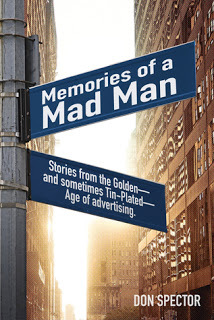 Forty years in the world of advertising provided Don Spector with entertaining stories just asking to be told. The success and interest in the TV show, Mad Men, inspired Spector to write his real-life Mad Man stories for readers to enjoy. His Memories serve to negate or corroborate the legends of Madison Avenue.
Forty years in the world of advertising provided Don Spector with entertaining stories just asking to be told. The success and interest in the TV show, Mad Men, inspired Spector to write his real-life Mad Man stories for readers to enjoy. His Memories serve to negate or corroborate the legends of Madison Avenue.Spector started his career as a junior copywriter and finished as the owner of his own ad agency. In between, he served as creative director at BBDO/West and a similar position at Foote Cone Belding/Los Angeles. He served on high-profile accounts that included ARCO, Absolut Vodka, Bristol-Myers and S.C. Johnson.
Q: What drove you to write your memoir, MEMORIES OF A MAD MAN?
Don Spector: I had been telling people about my adventures as a copywriter in advertising for years and they always seemed to enjoy hearing them. Then one day I made an amazing connection: I had all these stories in me and I had been writing commercials and ads for decades. Why not write them and put them all down together in…oh, what do they call it? Oh, yes…a book!
And the cherry on the whipped cream was the TV show Mad Men.Q: How did you choose the anecdotes to include in your book?
Don Spector: From my four decades in advertising I had so many stories to tell it was difficult to choose. My big breakthrough came when I decided to have each chapter cover a particular aspect of advertising. That decision helped me enormously by helping me divide up my stories into categories that I thought would interest my readers.
So, for instance, when I thought drinking would be interesting to my readers I had more than enough of those stories, both humorous and tragic, to tell. Once I decided on my chapter subjects like casting commercials, truth in advertising and music I could then choose those stories that were most humorous, most interesting and most dramatic.
Once I began that, I knew my book would not just be a random collection of anecdotes but a coherent and hopefully interesting look at my world of advertising… the period of the Mad Man.
Q: Why will your readers care about your experiences in advertising?
Don Spector: The experiences I tell about capture the real world of advertising at the time the storyline of Mad Men started. My book lets people compare what happened on the show with the real advertising world that I lived in. How close did the show come to the reality? In some parts it was dead accurate. In others the story modified reality for good dramatic purposes. Which was which? Hopefully my book will help readers tell the difference.
Q: Reviewers say that MEMORIES OF A MAD MAN is a “readable fun book.” How do you make it fun? Why is it readable? How important is humor to telling your story?
Don Spector: I'm very pleased readers have called this a readable book. Since I earned my living as a writer for over 40 years I would hope that my book was readable.
Humor was very important in writing my book because humor played a major part in my career. I learned early that humorous advertising could stop people so they get your message and I used it to sell everything from Bristol Myers’ nasal spray (“Winterize your nose with anti-sneeze.”) to extra legspace on airplanes (“You get 3 feet for your 2 legs on Western Airlines.”)
Humor also can make advertising more memorable. Think of the TV commercials you talk about the day after the Super Bowl. Most of them are humorous. I used humor in this book not just as a writing style but also because so many of the stories I recalled were humorous in themselves. Advertising can be a tension-filled profession and smiles and laughter can lighten the load. It's serious business when you're standing in front of a client showing them advertising you've created that you’re asking them to spend millions of dollars on. The smiles I often used in those situations helped make the sales. In writing the book I used humor to help make the smiles.
Q: How different is advertising today than when you started in the 1960s? Has it improved or degenerated?
Don Spector: Advertising today is monumentally different from what it was in the 1960’s. As an example, our son is an executive in a major ad agency and when he starts talking about what’s going on in his agency, after about 32 seconds I have no idea what he’s talking about. Where we worked to be impactful and creative in our advertising and looked for results in terms of increased sales, today a major part of advertising is a numbers game going after good statistics like how many people clicked on your internet ad or analyzing what search terms did people use to find your website.
It obviously works well but a great deal of the fun and glamour of the old ways has been lost. Example: when I was working in New York agencies, if it was winter and I wanted to go to warm, lovely California, I’d write a commercial that had palm trees in it. A week later I’d be sipping champagne in First Class on a plane bound for L.A.
Today if I did it, they would shoot the tropical scenes in a New York studio and then later lay in the palm trees by computer. Not quite as much fun for me.
About Don Spector
Starting as a junior copywriter in a Madison Avenue ad agency in the ‘60s, Don Spector qualifies as a genuine Mad Man. Creating advertising for the agency’s high-profile accounts like Smirnoff Vodka and Tareyton cigarettes, he began his ascent up the creative ladder in several New York agencies. His commercials and print ads for advertisers like Xerox, the Yellow Pages and Jaguar ultimately led to an offer of a key position in Los Angeles-based BBDO/West where he was soon named Creative Director. After moving to a similar position at Foote Cone Belding/Los Angeles, he eventually started his own agency where he served until his retirement. The advertising he created for dozens of companies like ARCO, Absolut Vodka, Bristol-Myers and S.C. Johnson won numerous awards. But, more importantly, it generated millions of dollars in sales for them.
About MAD MEN
Mad Men.
Don Spector didn’t just watch them on television. He was one of them.
Starting in a Madison Avenue ad agency in the ‘60’s, he actually lived the life captured in the TV show. In "Memories of a Mad Man" he shares with us an unforgettable era filled with humor, brilliance, wonderful heroes and big, bad villains.
The funny and fascinating stories he tells uncover the reality of the ad world behind the show.
• What was it like dealing with celebrities of the era?
• How did the advent of computers spoil one of the greatest boondoggles that Mad Men—and Mad Women—enjoyed?
• The Three Martini Lunch. True or false?
• What's the real truth about truth in advertising?
The book answers these and many more intriguing questions in this unique look into a unique profession.
LINKS
PURCHASE AMAZON
B and N
KOBO
iTunes
AUTHOR
GOODREADS
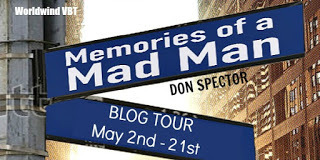
Published on May 02, 2016 20:05
April 25, 2016
WHAT THE EXPERTS SAY: Jeff Musillo, Author, Visual Artist, Actor, and Director
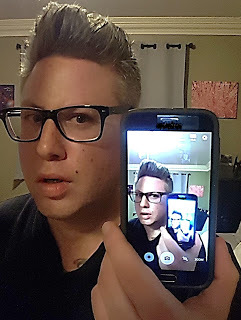 Jeff Murillo, Author
Jeff Murillo, AuthorTHE ETERNAL ECHOReviewers describe Jeff Musillo as a “prolific and eclectic author, who has the ability to surprise his audience with something completely new every time.” His latest novel, THE ETERNAL ECHO, is about a boy raised strictly with technology who turns into a “murderous monster—” a story without humor, because, Musillo says, he couldn’t fit any in. He both likes and dislikes technology.
In addition to writing novels, Musillo is also a visual artist, actor, and director. His paintings have been exhibited at more than twenty shows in NY and presented in a number of publications. His various films have premiered at several film festivals. He takes advantage of the benefits of each art form to express what he’s feeling. He’s currently working on a new story about the return of Jesus who no one knows is Jesus, resulting in his being treated as if he’s a homeless person. Musillo lives in Broklyn with his wife and family.
Q: Your latest novel, THE ETERNAL ECHO, described by reviewers as “both chilling and eye opening”, tells the story of a boy raised strictly by technology with disturbing results. How did you conceive of such a plot? Do you dislike and/or distrust technology?
Jeff Musillo: I have moments where I both like and dislike technology. I suppose I sometimes distrust it too. I usually find myself liking it though. There are plenty of positives with technology. Technology can be used to help spread the word on small businesses and artistic projects. It can help connect people from all over. It can also help shed light on areas that are contending with terrible struggles and deserve more attention. But then there are moments when I’m walking down the street and I keep getting bumped into people who can’t stop playing candy crush or something. Those are the times when I hate technology.
But with this book, at first, I wanted to make a story that was a bit more lighthearted. It just didn’t stay on that course. The more the protagonist developed the more he took control and guided the story to where it was supposed to go, which is into darkness and horror. It just so happened that the darkness and horror were connected with the misuse of technology by a complete madman.
Q: A reviewer says THE ETERNAL ECHO is “perfect balance between fiction/story telling and realism.” How do you assure readers that your story is credible, or believable? Does it matter?
Jeff Musillo:Believability is important to me. It’s what gives the reader something to truly clutch. With writing, the most important thing to me is making the characters recognizable and convincing, which in turn makes the entire story authentic. I think that starts with the language. It might be occasionally difficult, but it’s always best for a writer to dump their ego when they’re working on a story and do what’s best/normal/exciting not for themselves but for the actual character(s). By doing so, a writer might be taking themselves into unfamiliar and sometimes startling places, but it will be a place of genuineness. Q: “Both main characters in this story are deeply flawed, and in them I see a lot of myself, especially with my own up bringing.” What makes your characters relatable in THE ETERNAL ECHO?
Jeff Musillo:Making relatable characters is all about how a writer approaches his or her story. I once heard Bryan Cranston in an interview talk about Walter White and, when asked about dealing with the sometimes contemptible nature of that character, Cranston said something about how it’s not his job to judge Walter White, but that it is his job to bring the character to life and maintain his existence in a way that Walter White would actually exist. It’s the same thing with creating and writing literary characters. The writer shouldn’t judge. The writer should ask, What would this character do next and why would this character do such a thing? By doing so, characters become fuller and more human.
Q: When you write, are you intending to strictly entertain your readers or do you want to deliver a message or two? Similarly, is your visual art intended to say something?
Jeff Musillo:It’s a little of both. When I write and when I paint I am the first audience member for the particular project. So I start writing and painting things I’d like to visualize. And then the story or the painting takes itself where it wants to go and I just follow. But I do believe someone who works in an artistic way is usually trying to say something – sometimes they’re saying something silly, sometimes they’re saying something significant. And sometimes, when everything is clicking, delivering a message and entertaining a reader can go hand in hand.
Q: THE ETERNAL ECHO is your fourth published novel, and you are also a visual artist, actor, and director. Do you prefer any of these creative outlets more than the other? Or does each of them produce a different sense of satisfaction?
Jeff Musillo: I boil everything down to Storytelling. There are of course different ways to tell a story. Through literature. Through film. Through visual arts. But I still look at it all simply as storytelling.
I view the brain as a cabinet. Somedays I want work on the novel, so I open that cabinet drawer. Other days I want to paint, and on those days I open the necessary drawer. This way it’s pretty much all part of the same thing, but it’s still separated and situated neatly.
Q: Your other novels fall into different genres. How do you select what stories you’ll write?
Jeff Musillo:It’s all about mood. This too I try to keep as simple as possible. If I feel like working the poem then I make a point to do so. If that’s not happening, maybe the short story will. I just try to keep my mind open to whatever mood might pop up. This way it always keeps the actual act of writing fresh and amusing.
Q: How valuable is humor to telling your stories and/or creating your characters?
Jeff Musillo:It’s funny, if you asked me that before I wrote THE ETERNAL ECHO I’d say that humor, even in trace amounts, is always essential to a story. I still believe that, for most stories, finding something funny to work with is not only enjoyable but also provides a major advantage to the story as a whole. While I was writing my other novel – THE EASE OF ACCESS – I found it important and entertaining to locate humorous moments. However, there is absolutely no levity in THE ETERNAL ECHO. I just couldn’t find any opening for a laugh. I don’t believe the story called for it. I suppose each story calls for its own thing. If a story should be dark, make it dark. If it should be funny, make it funny. But never force anything because that push will be obvious to the reader.
Q: Adjectives such as “unique,” “different,” “surprise,” “new” are used to describe your written works. What makes you look at the world askew and off center?
Jeff Musillo: See that’s the weird thing. I honestly believe I look at things in a normal way. And in conversations with others, I often feel like I’m the boring person. But when it’s all said and done, ever since I was kid, I’ve known what really interests me and all I can do is pursue those interests. I’ve never really thought about whether those interests are unique or typical. I’ve always just pursued what felt right.
Q: What’s next?
Jeff Musillo: I’m currently writing a story about the return of Jesus, but in this story no one knows he’s actually Jesus, so he’s treated almost as if he’s homeless as opposed to supernatural. I’m not sure yet if it’ll be a novel or a novella, but I’ve been having a good time working on it.
Q: Tell us about Jeff Musillo. What do you like to do when you’re not writing, painting, acting, or directing? I mean, what do you like to do for fun (assuming you have time)?
Jeff Musillo:That’s honestly it for me. That’s who I am. When I’m not doing those things I’m working a day job so I can eventually do those things. If you add hanging out with my wife and my family members to writing, painting, acting, directing, then you’ll get the whole picture. That’s everything there is to know about me.
About Jeff Musillo
Jeff Musillo is a writer, visual artist, actor, and director. He is the author of THE EASE OF ACCESS (2013), CAN YOU SEE THAT SOUND (The Operating System, 2014), SNAPSHOT AMERICANA (Roundfire Books, 2014) and THE ETERNAL ECHO (Strawberry Books, 2016). His paintings have been exhibited in over twenty shows around New York, and have been showcased in magazines in both the U.S. and Europe, including The Menteur in France, Arrow Magazine, and Aesthetics Magazine. His paintings were also in the feature film, In Case of Emergency. His work in film, as a screenwriter, director, and actor, has premiered at The Hoboken International Film Festival, The Jersey Shore Film Festival, and The Katra Film Series. His screenplay, In The Ring, is currently in pre-production and will be directed by Aaron Latham, who wrote Urban Cowboy and The Program. And he was recently cast in the HULU pilot, Shelter. He currently resides in Brooklyn, New York.
About THE ETERNAL ECHO
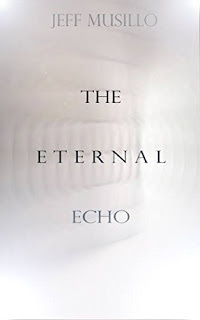 THE ETERNAL ECHO is a terrifying story, equal parts literary and horror. Doctor David Ravensdale is a madman who conducts an experiment by adopting a baby and raising him from infancy to adulthood, strictly by use of technology. The Good Doctor believes he is attempting to discover the key to the human psyche, and conducting one of the most significant experiments known to man. In actuality, he’s raising a murderous monster. THE ETERNAL ECHO is a millennial mix of Frankenstein and American Psycho. You will never look at your computer the same way again.
THE ETERNAL ECHO is a terrifying story, equal parts literary and horror. Doctor David Ravensdale is a madman who conducts an experiment by adopting a baby and raising him from infancy to adulthood, strictly by use of technology. The Good Doctor believes he is attempting to discover the key to the human psyche, and conducting one of the most significant experiments known to man. In actuality, he’s raising a murderous monster. THE ETERNAL ECHO is a millennial mix of Frankenstein and American Psycho. You will never look at your computer the same way again.Links:
ETERNAL ECHO at Amazon
Website
Published on April 25, 2016 21:39
April 11, 2016
WHAT THE EXPERTS SAY: K. E. Mullins, Author
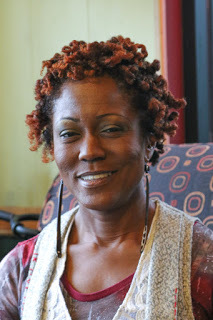 K.E. Mullins, Author
K.E. Mullins, AuthorIN THE COMPANY OF STRANGERS
FRIENDS AND FAMILY CONNECTION
THINKING ALOUDK. E. Mullins brings us the second book in her Team Ice series, featuring DEA Agent Anita Johnson, IN THE COMPANY OF STRANGERS. Mullins writes her characters to engage readers by making them people they can “relate to.” In addition to creating an entertaining story, Mullins remarks that she does intend to deliver a message, “You never truly know those around you.”
Retired from the Navy, Mullins currently lives in Gainesville, FL, where she works as a Navy Junior Reserve Officer Training Corps (NJROTC) instructor. In addition to IN THE COMPANY OF STRANGERS, she has also published a book of poetry THINKING ALOUD: DIMENSIONS OF FREE-VERSE and the first Agent Anita Johnson novel, THE FRIENDS AND FAMILY CONNECTION: GET UNPLUGGED. When she’s not writing, she is passionate about running and has completed two marathons. Her current goal is a triathlon, and she is working on the swimming. She expects to publish the third book in her trilogy in late 2016.
Q: IN THE COMPANY OF STRANGERS is your second book in the Team Ice series. What inspired you to create your protagonist, DEA Agent Anita Johnson, and her partner and boss? Do you have experience with the DEA?
K. E. Mullins: Yes, Joyce this is the second in the series. I was inspired by my first job after retiring from the Navy. It was a property management firm, privately owned and it had a lot of interesting people in the company. So, after I left working there, I decided they would make a good story. Anita was inspired by a good friend of mine that worked there, but she wasn’t a DEA agent. Chloe is my alter ego and her boss, well let’s say he’s just a combination of good looking intelligent guys I’ve come across over the years.
Q: How do your characters engage your readers? What will make readers care about your characters?
K. E. Mullins: My characters engage the readers because they are people they can relate to in some way or another. Anita is a type A personality. She never rests and is always thinking of ways to catch Gabrielle and the crew. She can be better described as the girl who’s first in the office and last to leave. Elle on the other hand is ruthless and is all about her.
Q: Does the concept of hero versus villain apply to your story? Is your DEA agent a hero? What makes a hero? What makes a villain?
K. E. Mullins: My story does have heroes and villains, but not in the sense Anita is the good guy and Elle and Gabrielle are the bad guys. Although, Anita is the detective or good girl. Ellen plays a part in here and she is bad, but she in essence is good by eliminating a person in Chloe’s life. I don’t want to give it away. You’ll have to read the book to see what I’m referring to. So, to answer your question a hero can save the day and be viewed as good or bad. It depends on how you interpret their actions.
Q: Did you write IN THE COMPANY OF STRANGERS strictly to entertain, or did you embed some key messages in it for your readers?
K. E. Mullins: It was written to engage the readers and send a message. We are always in the company of strangers. You never truly know those around you.
Q: Were you able to use the setting in Washington, D.C. to help tell your story? Would it have been a different story if set in a different city?
K. E. Mullins: D.C. helped because it is faced paced and a lot going on. So, it helped the reader see the movement. As opposed to Gainesville, Fl or a smaller city. It wouldn’t propel the story or show the action as much.
Q: How helpful is humor to tell your story or create your characters?
K. E. Mullins: Humor helps lighten the mood and take the reader away from stressful situations taking place.
Q: What makes your story credible? How important is plausibility to engaging readers? What will make a reader stop reading a detective story?
K. E. Mullins: My story is fiction, however, there are a lot of facts that do take place in the story. It’s a combination of stories or events that have taken place in some setting or place. I do extensive research on subjects that are not my expertise such as drug rings. Additionally, most places that are in the stories I’ve lived in, which helps in the plausibility of the story.
I believe a reader will stop reading a story if they’ve been to a place and they find the areas described in a story incorrect or the actions taken by characters unbelievable.
Q: You have written and published poetry as well as your novels. Do you prefer one over the other? Are you able express yourself in different ways with the two approaches?
K. E. Mullins: I’ve have written a book of poetry also. I prefer writing novels, but poetry is easier. But…I have to be in the mood to write poetry. I can’t sit down and write poetry for hours like I can do a fiction novel. For poetry, I have to have an event or mood to inspire me. In writing fiction…I become the characters. So, it’s easier to get them on paper.
Q: What’s next?
K. E. Mullins: The final book in the Ice series. I plan to complete it this month. I’m still stuck at the computer with Chloe.
Q: Tell us about K. E. Mullins. What do you like to do when you’re not writing?
K. E. Mullins: K.E. Mullins is an avid runner. I love doing races, my favorites are half marathons. I’ve done 2 marathons (the Marine Corps marathons), but I have no desire to do another. My ultimate goal is a Triathlon now, but I’m still working on the swim. Other than running…I’m busy with my Navy ROTC kids at school. They keep me busy throughout the year.
About K. E. Mullins
Her first poetry piece, “My One Last Cent,” was published in a literary journal, “Amistad,” in 2007 at Howard University. Currently, Ms. Mullins has published a book of poetry, THINKING ALOUD: DIMENSIONS OF FREE-VERSE; and two novels, THE FRIENDSAND FAMILY CONNECTION: GET UNPLUGGED and IN THE COMPANY OF STRANGERS (TEAM ICE Book 2) available on Amazon in paperback or Kindle. She is currently finishing the last book in her fiction trilogy and expects the third novel, “Another Name for Revenge,” to be released by late 2016. Ms. Mullins was a winner of the NanoWrimo 2015 completing just over 50,000 words in 30 days. In addition to writing poetry, she has done spoken word venues in Urban Grind, Atlanta, GA, Busboys and Poets in Washington, D.C., and the Thomas Center, Gainesville, FL.
About IN THE COMPANY OF STRANGERS (TEAM ICE Book 2)
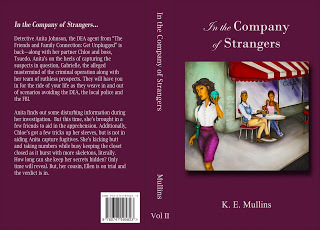 Detective Anita Johnson, the DEA agent from THE FRIENDS AND FAMILY CONNECTION: GET UNPLUGGED, is back—along with her partner Chloe and boss, Tseudo. Anita is close to capturing the suspects in question, Gabrielle, the alleged mastermind of the criminal operation, along with her team of ruthless prospects. They will have you in for the ride of your life as they weave in and out of scenarios avoiding the DEA, the local police and the FBI.
Detective Anita Johnson, the DEA agent from THE FRIENDS AND FAMILY CONNECTION: GET UNPLUGGED, is back—along with her partner Chloe and boss, Tseudo. Anita is close to capturing the suspects in question, Gabrielle, the alleged mastermind of the criminal operation, along with her team of ruthless prospects. They will have you in for the ride of your life as they weave in and out of scenarios avoiding the DEA, the local police and the FBI.Links
IN THE COMPANY OF STRANGERS Amazon: Kindle or paperback
THE FRIENDS AND FAMILY CONNECTION: GET UNPLUGGED Amazon: Kindle or paperback
THINKING ALOUD: DIMENSIONS IN FREE-VERSE Amazon: Kindle or paperback
Twitter: @jazypoet
Facebook Goodreads
Published on April 11, 2016 20:57
April 4, 2016
WHAT THE EXPERTS SAY: Sarah K. Stephens, Author
 Sarah K. Stephens, Author
Sarah K. Stephens, Author"Boys" in Five on the Fifth
A Flash of Red Sarah K. Stephens, a developmental psychologist and university lecturer, recently published her short story, Boys, in Five on the Fifth Literary Magazine. Stephens describes her story as a “commentary” on the lack of effectiveness of university “reporting systems” for campus sexual assaults. She plans to release her first novel in the winter of 2016. A Flash of Red is a literary psychological thriller that concerns the effect on intimate relationships of the inability to separate what we want versus the reality of our lives. She is currently working on her second novel, Dear Heart, set in the suburbs of northern Pennsylvania and Riga, Latvia in Eastern Europe. She also has several short stories underway, and values both novel and short story media.
When she’s not writing, Stephens enjoys spending time with her husband, playing cards with her children, traveling and baking cakes. She also is “addicted” to podcasts.
Don't miss the excerpt of Flash of Red following the interview.
Q: What caused you to write your short story, Boys,recently published in Five on the Fifth Literary Magazine?
Sarah K. Stephens: The beginning idea for this story came in response to students sharing their experiences of sexual victimization. As I was encountering more and more cases in my professional life as a university lecturer of young people describing their inability to complete coursework or function on campus as they coped with the effects of a rape or sexual assault, universities around the US were coming under scrutiny for their failures to adequately address these issues as part of remedying an unbalanced and, too often, unsafe campus culture. Boyswas written in direct reaction to what I saw on my own university campus, along with those across the country.
Many universities, including my own, have instituted an emergency alert system where all subscribers receive messages of emergencies on campus. I signed up assuming it would be used in the case of campus threats, but from 2012 on it primarily became a medium for the university to notify subscribers that a sexual assault had occurred on campus. Rather than being a mechanism for addressing sexual violence on campus, it appeared to function solely as a reporting tool. As the messages piled up in my inbox, I started to worry, first, about the victims and what was being done to prevent sexual assault and to help survivors, but also about the potential for these messages to desensitize subscribers to the issue of sexual violence. It felt like a superficial attempt to address a very serious issue of safety for students.
My story is a commentary on this reporting system and its potential for harming the cause of ending rape on campus. It examines three young men who proceed to kidnap a woman walking home from the university. They believe this woman witnessed them committing a minor traffic crime, and the plot proceeds from there, the alert system playing a major role throughout the story.
Q: You plan to release your first novel, A Flash of Red,in the winter 2016. What can you tell us about it? In what genre is it?
Sarah K. Stephens: A Flash of Red is a literary psychological thriller. It examines how our intimate relationships are affected when we lose the ability to discriminate the reality of our circumstances from what we desire our lives to be. A Flash of Red revolves around three main characters: Anna and Sean, who are young married professionals, and Bard, who is a university student in one of Anna’s courses. Each of them struggles with their own personal disconnections from reality—Anna’s and Bard’s stem potentially from mental health issues, whereas Sean’s is a coping tool to deal with his crumbling marriage to Anna. Throughout the book, these characters become further intertwined until all three must face the truth of what their lives have become, and the part they each played in destroying what they once had.
Q: Do you prefer writing short stories or novels? Do you see an advantage to both?
Sarah K. Stephens: I enjoy writing both. Often, after working on a novel manuscript for a while my mind needs a break from the extended threads of characters and plot that are necessary for writing an engaging novel. I have a notebook where I write down ideas that come to me, and many of these are small observations about human connection or the complexities of navigating our social world. These ideas might not lend themselves well to a full novel, but are approachable in the shorter format of a story. Short stories offer a way for me to express an idea without the commitment necessary for a novel. It’s a joy to be able to switch between both modes, depending on what is inspiring me that particular day.
Q: How relevant is your career as a development psychologist to your stories? Is fiction a helpful method to explain psychological issues or problems that you see?
Sarah K. Stephens: I feel as though my training in psychology plays a foundational role in all of my writing. Not necessarily in regards to mental health, although that is certainly a strong current in A Flashof Red, but also just in the powers of observing human behavior. I am a behaviorist by training, which means that my skills are focused on examining reinforcement and punishment experiences and how those shape our interactions with each other and our environments. Being able to step back and see how our relational history can shape our future behaviors certainly helps me in creating whole and rich characters, along with a driving plot. Humans are the products of our developmental pasts, and I enjoy using my writing to examine how what happened yesterday, or a year ago, or in our childhood even, shapes our future choices, both as individuals and as relationship partners.
Q: Do you use humor either in your short story or novel to help develop your characters or tell your story? How helpful is it?
Sarah K. Stephens: As a writer, I think the humor I use is subtle and rather dry. There is definitely a sardonic atmosphere to Anna’s character, who has strong opinions about her own achievements and how they compare to those of her colleagues, her husband, and her friends. Within my short stories, so far at least, the humor I offer is more often one that shares an alternate side with sadness. Some of my characters seem to use humor as a way to distance themselves from the discomfort they’ve created in their own lives—it becomes a protective technique, rather than one of celebration.
Q: Why will readers engage with your characters? Does the concept of heroes vs villains apply to your stories? Does a villain have to be a person or can mental illness itself be classified as a villain?
Sarah K. Stephens: Throughout A Flash of Red, all three characters fluctuate between ethical and unethical behavior in their interactions with each other and with others. I think Anna, Sean, and Bard all represent the complexity of human nature—how we can be empathetic one moment and then flip into an entirely selfish repertoire the next. Anna in particular prides herself on her ability to care for and be considerate of others, but often this compassion is fueled by self-interest. I feel this pressure to reconcile our self-focus with our love for others is a conflict most human beings struggle with. Within my field of developmental psychology, there is a long-running debate about whether humans can ever engage in a truly altruistic act—that our actions are always seated in some form of self-preservation. In that sense, we all function as heroes and villains at different points in our daily lives.
As for mental illness, I wouldn’t classify it as a villain any more than I would classify a more traditional physiological ailment as villainous. Mental disorders are a fact of our neurology and are often grounded in our genetics and/or the physical functioning of our brains. I suppose I am most interested, not in the villainous tendencies of ill individuals, but rather in how our state of mental health (or lack thereof) can shade our interpretations of our daily lives, and ultimately contribute to poor and sometimes dangerous judgments in our actions.
Q: You have described A Flash of Red as a literary thriller. How do you create the suspense to deliver a thriller?
Sarah K. Stephens: I think one of the main facets of a compelling thriller is to give the reader enough information to make predictions about what is going to happen in your story, but not enough that they can solve the puzzle too early on. I’m a huge fan of P.D. James and, although she wrote mysteries and not thrillers, her ability to pepper her decadent prose with hints for the reader made her novels feel like a treasure hunt. Every time I began one of her mysteries, I told myself I would figure out the ending before she revealed it. And I never did!
The other important rule to keep in mind is to never underestimate your reader by using clichés and common tropes in your writing. Thriller audiences are going to feel belittled if you don’t present a fresh and unique plotline—so much of writing a thriller is knowing how you are going to captivate the readers with something unexpected and, although dark, also delightful in its unpredictability.
Q: What makes your stories plausible and credible? Did you need to do any research?
Sarah K. Stephens: Being a development psychologist, I feel many parts of this story emerged out of my professional training. I have long been fascinated with the human mind and the complexity of our social relationships—which is undoubtedly why I chose a career devoted to these topics—and so it isn’t surprising that my creative writing often examines how our connections to each other can go wrong.
For A Flash of Red, I reviewed scientific publications related to the symptomatology, prognosis, and treatment of schizophrenia. It’s a complex and multifaceted disorder, with a great deal of variety in its expression from one individual to another, and I wanted to make sure my representation in the novel was as accurate as possible. Reading Elyn Saks’s memoir, The Center Cannot Hold, provided a window into the personal experience of schizophrenia and the system of treatment many patients encounter.
My interest in de Clerambault’s syndrome began, not from my training, but upon reading Ian McEwan’s novel, Enduring Love. From there, I read the scientific literature that is available on this somewhat obscure disorder in order to incorporate facets of it into my own writing. It’s a great fit, given my interests--the syndrome is truly an archetype for love gone terribly wrong.
My research for my short story, Boys, revolved more around understanding the system of reporting Sexual Assault established at my campus and at universities across the country, along with organizing my knowledge of the Title IX investigation of over 50 universities and resulting responses to these investigations.
Q: You plan to release A Flash of Red later this year. Do you plan to continue writing? If so, what are you considering next?
Sarah K. Stephens: Definitely. I have several short stories in the works or in a state of seeking publication, along with a finished draft of my next novel, Dear Heart. This novel alternates between the suburbs of northern Pennsylvania and Riga, Latvia, in Eastern Europe. It focuses on a Russian Orthodox family who is seeking to adopt an older child, and the family secrets that are revealed during that process.
Q: Tell us about Sarah K. Stephens. What do you like to do when you’re not writing or teaching?
Sarah K. Stephens: I enjoy good food, healthy exercise, and travel. An ideal day-off for me would involve a nice long run in the morning, baking a cake in the afternoon, and playing cards with my children and husband in the evening. I’m addicted to podcasts (Serial, This American Life, and TED Radio Hour being some of my favorites) and can often be found with a good book and a glass of wine curled up by the fireplace.
About Sarah K. Stephens
Sarah K. Stephens earned her Doctorate in Developmental Psychology in 2007 and teaches a variety of courses in human development as a university lecturer. Although Fall and Spring find her in the classroom, she remains a writer year-round. Her debut novel, A Flash of Red, will be released in Winter 2016 by Pandamoon Publishing.
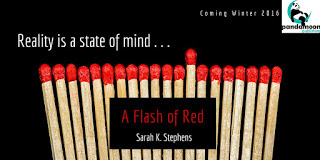
Excerpt: A Flash of Red (to be published winter 2016)Anna’s heart skipped a beat in a wave of involuntary fear. There were only two eggs in the refrigerator.Five minutes before, Anna came down the stairs, perfumed and fully dressed, ready to begin her day. She would make pancakes for her husband, who was still asleep in their bedroom. She would wash fresh raspberries to put on top. She would lay the table with care. All of this to set a pattern of comfortable predictability for Anna, ensuring the day would unfold in a way she could control. But now, everything was skewed by yet another ordinary situation somehow turned inexplicable in Anna’s life. Or at least she preferred to see these blips in her daily horizon as having no reasonable explanation, because the most reasonable explanation of all was unacceptable. She’d checked last night before going to bed--everything she needed was there. A full carton of eggs, their twelve white orbs nestled neatly in the divots on the side of the refrigerator door. Anna always took them out of their cardboard container after returning from the grocery store and moved them lovingly to their designated place. So where had they gone?And that’s when it rushed over her. Standing in front of the pristine refrigerator, its clean angles and cool air pouring over her chest and thighs through the thin satin and crepe of her dress, Anna thought again about the dark spot inside her head. The one we all share. The one where our brain oversteps the rules of generosity and creates reality for us. She learned this small biological fact with indifference in college. Now, when it shoved its way into her conscious thought, like it had just now, the sheer density of it warped her mind like a black hole, devouring everything around it. How else do our minds betray us? How will mine? Anna knew only part of the answer.Anna blinked rapidly in an attempt to clear the blurry sights in front of her. She could fix this. Everything could be put back in order. Ignoring the skittering thoughts inside her head, Anna amended her plans. She had two eggs. She would make them sunny-side up for Sean with two slices of her homemade bread and strawberry jam she canned herself last summer. The fresh raspberries she would put on the side for him in a bowl. She would eat cereal afterwards while Sean did his assigned chores.Anna took a deep breath. And another one. Then she shut the door to the refrigerator and placed the eggs on the counter by the stove, careful not to crack their fragile shells. Putting her favorite cast iron pan onto heat with a bit of Portuguese olive oil drizzled inside, Anna wrapped her slim fingers around the first egg, feeling the tensile strength of the shell shift slightly under the pressure. In one swift and practiced movement, Anna split the shell against the edge of the skillet and poured the viscous contents out, the yolk centered perfectly within the white that emerged from the sizzling heat. Yes, that was better. Links
Blog Twitter: @skstephenswrite Panda moon Publishing Blog Facebook Page Sarah K. Stephens Short Story Boys featured in Five on the Fifth literary magazine March 2016 IssuePublisher’s Announcement of A Flash of Red Pandamoon Publishing Site
Published on April 04, 2016 19:34
March 30, 2016
WHAT THE EXPERTS SAY: Max E. Stone, Author
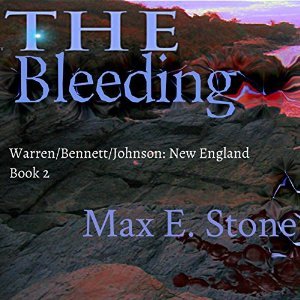
Max E. Stone has just released THE BLEEDING in audio format narrated by Noah Michael Levine. Reviewers describe the novel, which is the second in his New England series, as a “psychological thriller with more than a touch of horror” and "well drawn" characters. Stone claims that he pens the characters and stories that are “already in his head.”
Stone, who’s been writing since he was nine, is currently working on a new novel, Black Roses, which is his fifth book but the fourth story in the series. When he’s not writing, he likes to spend time with family and friends, do yoga, and watch the funniest shows he can on TV – to help relax.
Don’t miss the excerpt from THE BLEEDING following his interview.
Q: Reviewers claim that THE BLEEDING “is a whole new level of horror!” about “how evil begets evil.” What drives you to write in this genre? Would you compare your books to those of Stephen King?
Max E. Stone: I’m always so honored to hear things like that. I honestly didn’t even know that what I was writing was a whole new level of anything, horror or otherwise. The characters and stories already in my head drive me to write and I just keep the pen and paper handy. And, though I love his books, I wouldn’t compare myself to the amazing Stephen King. He has his lane and level and I have mine and I think I’m pretty good for where I am. I’m still growing. But I do hope to get there.
Q: “Plot was brilliant,” says a reviewer. How did you conceive of your plot?
Max E. Stone: This plot was something that started when I was 9 years old with my first book, August to Life. It started as a story about a family. Then, over the course of about a few more years or so, I added more characters. Suddenly, there were three families in total. But there was one character that both intrigued and frightened me and others who I let read pieces of the work. His name was Derek Warren. Absolutely the most heinous character I’d ever put together. So I asked myself “why does this person do what they do?” and “what will they do next?” That was how THE BLEEDING came about. I just thought of how bad he could possibly be in addition to how bad he already was as well as the reasons why.
Q: How do you create a “full cast of strange and wonderful characters” that will engage readers? Do you base your characters on people you know, or are they entirely drawn from your imagination? Are they heroes or villains?
Max E. Stone: I combine the two processes. The characters’ names and a few characteristics start out solely from my imagination while the rest of their profiles are combinations of different people that I know, good and bad. In that way, I try my best to make them as human as possible. For example, Derek Warren has some of the traits of the most loveable people in my life. Yet, he’s been warped and, in turn, has warped those good things about himself into hurting those around him.
Q: What makes a “thriller?” How do you create “one hell of a thrill ride,” as one reviewer describes THE BLEEDING?
Max E. Stone: The mind games that happen all throughout the story. You’ll think it’s going one way and then you’ll end up on a totally different path of exploration toward the end.
Q: What makes your story credible? How important is plausibility to engaging readers? What will make a reader stop reading thriller fiction?
Max E. Stone: Despite the thrills and craziness that go on, at its core, THE BLEEDING is a story of normal characters and how they cope with the worst of times in their pasts, how they live life, how they fall in love, etc. That’s everyone, no matter where they come from. That is what, I believe, makes the story credible.
As far as engaging readers, it is absolutely important to do so. In thriller fiction, even with the on-the-edge-of-your-seat moments that make up the genre, I think it’s most important for a reader to have a character or situation within the book that they can identify with. Otherwise, they’ll stop reading.
Q: Do you use setting to help tell your story? Are your characters a product of their surroundings?
Max E. Stone: I do look up settings and I’ll use the characteristics of those settings in a given place. And, for the most part, the characters aren’t products of their surroundings. For some of them, it’s upbringing that they have to push past in order to be better and do better. Some of them do that, some of them don’t.
Q: How helpful is humor to creating your characters? Is humor useful in a horror thriller?
Max E. Stone: Extremely helpful. Humor makes them more real because people make jokes especially in horrible situations. That’s what makes them human and, for some, that’s what helps them cope with the situation.
You have to have some relief from the horrible; some humor despite the horror to truly grasp that horror and appreciate the relief for however long it may be.
Q: Did you write THE BLEEDING to entertain your readers or did you embed a few messages along the way?
Max E. Stone: I think the point of any story, movie, or artistic creation should be to draw the reader, listener, or viewer into a world that they may not be aware of. That’s what art does. I would like to think that I did embed a few messages along the way as that was definitely my attempt.
Q: What’s next?
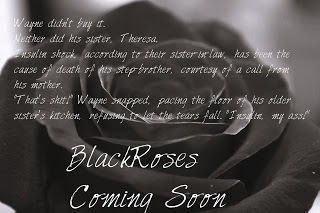 Max E. Stone: I’m working on Black Roses, which is the fifth book I’ve written but the fourth story in the series. The synopsis is still in the works, but much of the characters will be the same with a new case for Detective Bennett that will be be absolutely a shake-up.
Max E. Stone: I’m working on Black Roses, which is the fifth book I’ve written but the fourth story in the series. The synopsis is still in the works, but much of the characters will be the same with a new case for Detective Bennett that will be be absolutely a shake-up. Q: Tell us about Max E. Stone. What do you like to do when you’re not writing or working?
Max E. Stone: I like to hang out with my friends and family and also do yoga. It’s very relaxing and does the brain very well. Also, I like to watch the funniest things I can find on TV or in the movies. Writing serious situations takes a lot out of me so periodically I like to just laugh and get all of that out of my system for a bit.
About Max E. Stone
Max doesn’t remember ever not creating a story, pen or no pen.
A writer and lover of books since the age of nine, Max first set pen to page as a hobby, constructing stories that were anything but fit for children. Entertaining classmates while simultaneously concerning surrounding adults with blood-ridden tales of gory mysteries and heavy suspense that “just came to mind,” Max, with the help of family and the encouraging words of an inspiring fifth grade teacher, continue to develop this gift.
Little was it known at the time, but said gift would become a lifeline.From horrific trauma in Max’s teen years, writing played an instrumental part in the difficult recovery and the Warrens, Bennetts, and Johnsons, three interconnected families all with issues, mysteries, and secrets that threaten their livelihood and lives, were born.
Max reads everything and everyone and relishes the journey, learning something new each day.
About THE BLEEDING
How does a maximum-security inmate commit a murder on the outside? The answer is more terrifying than you think.Mark my words....Derek Warren is smooth, charming, and a master manipulator.But is he a killer?I swear....If so, how is the former businessman committing murder from a maximum-security prison cell?And what, if anything, does he have planned next?You'll never see it coming....Detective Stephen Bennett is sure he has the answers to these questions.But the path of dead bodies leads him to a truth far more disturbing than he suspected....You will bleed....
Excerpt
"Mom...Mommy?" the trembling boy whimpered in jagged breaths.
His blonde head popped to the surface of blue bed sheets at the tormented wails that broke through his fitful rest on a freezing October night.
And then, silence.
He swallowed hard.
"Mommy?" he bawled this time, pushing covers aside and preparing to leave his bed to investigate the noise.
Again, the deafening and disturbing quiet.
The youngster eased toward his room's door, turned the knob, and inched the opening wider until he beheld the source of the racket.
"Mommy!" he screamed. Supported by the wall facing her son's room, his mother attempted to straighten her body and a mane of matted blonde curls with unstable hands.
Tender blue eyes, warm as a spring evening, waxed ice cold when she saw him watching her.
"Derek!" she fired, tremulous, from lips that swelled and seeped blood.
At the tears in her boy's baby blues, she softened.
"Daddy and I got a little loud. That's all. We're sorry we woke you. Go on back tobed, sweetie."
Without question, the child obeyed and feigned belief of her lie. The scar above his own left eye reminded him of the consequences if he didn't.
Barreling footstepsrocked the floorboards and Derek stoppedin his tracks. The red tint in his plump cheeks faded to a sick pale.
"Kim, baby?" a man drawled in a wicked singsong. "Where are you?" "Derek, shut the damn door!" the mother howled, fear setting her ablaze. "Do it now!"
In seconds, with theendof a brownish gold mullet clinging to theback ofhis damp neck and venomousblue-‐gray eyes, David Warren appearedand overtook Kim in threestridesof his powerful legs.
He snatched a handful ofherhair and shoved her into the wall face-‐first.
She slid to the floor when he unhanded her.
Blood dripped in the crack where her face landedand followed her body to the ground.
"Daddy, stop!" Derek cried."Honey, please!" Kim begged David, crawling while covering an eye. "Not in front of Derek!"
Dark red liquid wept through her fingers.She cowered to a fetal position, not knowing when, where, or how he would strike next.
Wait for the blow...
Be somewhere else...
Dealt as predicted, strike one landed at her nose; the bone's split audible.
"This is my house," David told her in all sincerity, catching Kim's wounded facein his hands and thumbing the deep red juices that oozed from her nose and eye.
"You are my wife and you must do as you're told. If you continue to disobey, this will keep happening. Understand?"
He didn't wait for her classic quivering nod.
They had this talk before.
It took years for her to get the message.
But, nonetheless, she got it.
She knew herplace.He freed her, straightened,and turned to the eight-‐year-‐old whomade nomove to leave thescene.
"Go to bed, sport," the father ordered then directed a playful smirk to theboy's mother; the same masculine grin that won her heart at a church picnic years ago.
The one that had later been accompanied by a large diamond ring and a heartwarming marriageproposal.
"Mom and I need some time alone."With those calm words, David lifted his wife from the floor, dragged her to himself, and crashed his mouth down on hers; his tongue lapping up her blood.
When he finished the unwilling invasion of her mouth, she shuddered and addressed a crippled "I'm fine, sweetie" to her son before both parentsvanished around a corner, leavingDerek alone and frightened in a puddleof his own urine.
Nothing out of the ordinary for a night at the Warren house.
His mother spent years asking for help.She beseeched relatives, friends, and the church.The kids in Sunday School loved David Warren and wished to God they'd had the same stroke of good fortune in managing "the coolest pastor in the world" for a dad.
The women at the church talked of his mom's "luck" in having landed the minister for a husband.
The police rendered no help either.Most of them knew David from his work in the community. But Derek knew the truth.
And eight years of age would not stop him from saving the life of the woman who gave himhis.
Links Purchase LinksAudible site for THE BLEEDING Amazon Kindle
Author LinksWebsite Twitter @maxestoneFacebook Newsletter Goodreads
Published on March 30, 2016 18:47
March 28, 2016
WHAT THE EXPERTS SAY: A. M. Willard, Contemporary Romance Author
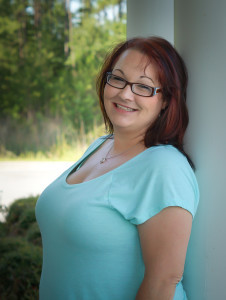 A. M. Willard, Author
A. M. Willard, AuthorHEARTS IN FLORENCEReviewers describe A. M. Willard's latest contemporary romance novella, HEARTS IN FLORENCE, a “fun, sweet, and romantic read” and a “wholesome love story.” Willard says humor is important in her stories along with today’s issues and fears. And she enjoys creating drama and suspense.
Willard has written several series and today lives in Georgia with “her husband, son, two cats, one rotten dog, two goats and her six chickens.” She is currently working on the second in her “A Taste of Love Series.”
Q: You categorize your books as contemporary romance. How does this genre differ from traditional romance? What do readers like to see most in a contemporary romance?
A.M. Willard: I think that contemporary romance is more your today’s romance- as in today’s issues, fears, and love triangles.
Q: Tell us about your latest novella, HEARTS IN FLORENCE. How helpful is setting the book in Florence to develop your plot and characters?
A.M. Willard: Oh it was so hard to set the background theme for this as I have never to Florence Italy… I had to do a lot of research to make sure I could convey the scenery to the readers. I wanted to take you on a trip while reading.
Q: Reviewers applaud your use of humor as part of telling a warm romance. How helpful is humor to create your characters, the romance, or the story?
A.M. Willard: Oh I think it’s very helpful. I love to write romantic comedy and even my friends have stated that it is perfect for me since I can let a piece of myself shine through my work.
Q: You’ve developed at least two series. What can you create in a series that you can’t do in a standalone book? Do you prefer a series over a standalone book?
A.M. Willard: I am half and half on standalones and series. I love how I can write a standalone and be done when I finish verses with a series you have to keep everyone’s life straight. Series to me allows me to have the best of both worlds, as you get to know all my characters.
Q: When creating a romance, what are the most important traits, or attributes, of the characters falling in love? What draws characters to each other? How important are setting and timing?
A.M. Willard: The setting is very important I feel. If I’m writing a ROM-COM I think a funny setting or situation is perfect, something to set the tone and mood for the rest of the novel, everything else usually just falls into place.
Q: Does the concept of heroes vs villains play a part in your books? What makes readers engage with your characters?
A.M. Willard: Sometimes yes, and I plan to work on this a little more in a future book. I haven’t had too many villains as of today.
Q: How do you create the tension or suspense to cause readers to want to turn the page?
A.M. Willard: I place myself deep in the story and fight against the plot as I write it. I start, stop, start and repeat. Creating drama and suspense seems to be the fun in most of the writing aspect. You can make it as crazy or as clam as you want.
Q: Do you write for entertainment only or do you embed a few messages in your books?
A.M. Willard: Oh I think the readers will have to answer that one. I think a few have some messages written within the pages for sure.
Q: What’s next?
A.M. Willard: Sugary Sweets is what’s next as I try to finish it up. This will be the second installment to A Taste of Love Series.
Q: Tells us about A.M. Willard. What do you like to do when you’re not writing?
A.M. Willard: I love to relax with my family and friends, and enjoy being out on the water as often as we can.
About A.M. Willard
A.M. Willard is a true believer of soul mates, and happy ever afters. She enjoys reading, sailing, and of course writing contemporary romance with some saucy scenes. Releasing her first novella of the One Night Series on April 12, 2014 has sent her on a new journey in life.
A.M.'s passion for writing started at a young age, but with the love and support from her husband of eighteen years pushed her to follow her dreams. Once she hit that first publish button, she hasn't looked back.
Publications available from A.M. Willard include the Chances Series, Love on the Screen, and everyone's favorite, the One Night Series. She's also had an article published in the Writer's Monthly Review Magazine and was just accepted into the Romance Writers of America organization in May of 2015.
A.M. Willard was born and raised in the Panhandle of Florida, but resides in Savannah GA with her husband, son, two cats, one rotten dog, two goats and her six chickens. Yes, we said chickens...
About HEARTS IN FLORENCE
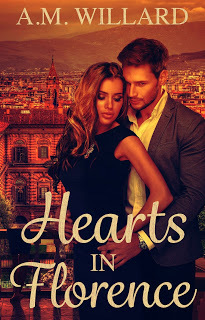 Raven Bloomberg finds herself stuck in Florence, Italy during a holiday weekend. One meant for lovers, not lonely art gallery assistants sharing the last hotel room with a dark and mysterious stranger.
Raven Bloomberg finds herself stuck in Florence, Italy during a holiday weekend. One meant for lovers, not lonely art gallery assistants sharing the last hotel room with a dark and mysterious stranger. She decides to loosen up and enjoy what the city has to offer. The only problem is she may be enjoying herself a little too much.
Pierce Ashton's eyes are set on Raven Bloomberg, the sexy yet reserved blonde that pushes him to limits he never expected.
Will their thirst be enough to continue the love affair once back in the states?
Will these two souls go back to living life as they did before, or embrace the passion ignited in the opulent streets of Florence.
Find out now in author A.M. Willard's contemporary romance novella, Hearts in Florence, which is best enjoyed with an Italian Merlot.
Links
Purchase LinksHEARTS IN FLORENCEAmazon USAmazon UKAmazon CAAmazon AU
Author LinksFacebookAuthor PageTwitter @AMWillard1 AmazonAuthor Page Blog– WebsiteGoodreadsGoogle+ Author PagePinterestLinkedIn NewsletterYoutube Readers group Instagram
Published on March 28, 2016 20:47



